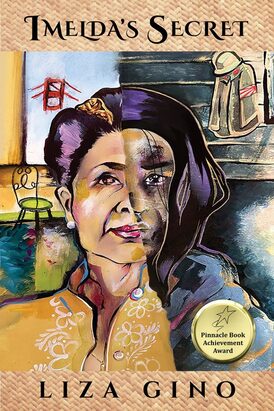WARNING: the following book and review involve sensitive topicsScore: 91/100
Imelda's Secret is a haunting and powerful story concerning the lives of two Filipino girls during one of the darkest times in human history: World War II. As Imperial Japan occupies the Philippines, along with much of the Pacific and East Asia, Filipino cousins Imelda and Gloria are faced with a grim future under Japan's violent rule. During that time, tens of thousands of girls and women were raped, sexually abused, trafficked, and/or murdered as “comfort women.” The two face this future with courage, faith, and quite a bit of cleverness, encouraged to “stay together... look after each other.” With all that said, this is not the story you're expecting it to be, at least it wasn't the book we were expecting to read. Imelda is not a Katniss Everdeen-archetype living under a totalitarian regime in a dystopian society who is abused on a daily basis. In fact, at least one-third of this book seems to be simply Imelda and Gloria living their lives, dealing with members of their family, and even falling in love. It's not that much unlike Diary of Anne Frank in that sense. We often hear Imelda's thoughts and her reflections on what she thinks about people and the past. More than 50% of this story is surprisingly passive. Things just seem to happen, and Imelda and Gloria are very often at the mercy of fate like pieces of driftwood caught in the tide. Indeed, that seems to be the point. Things happened to these girls and their loved ones that were simply out of their control. They fought as much as they physically could. However, what they do control is what they choose to do with the trauma now that the events have transpired. Do they remain silent about it and hope that it washes over with time or do they open up to the world? The character who surprised us the most was Kenji. No, he's no Oscar Schindler. No, he's no saint. In fact, there are times when Kenji even seems like the villain of Imelda's tale. The best comparison we can give for him is Rochester from Jane Eyre or Maxim from Rebecca. These aren't “good guys” in shining armor, they're entitled pieces of crap with a higher social status who happened to have a soft side for the characters. Something that pleasantly surprised us was that this book was not a hit-piece or a tirade of hate about the Japanese. It could easily have been. The Japanese were as much the big-evil in the Pacific and Asia as the Germans were in the Atlantic and Europe. Even when the Japanese are about to do terrible things in the book, we still see that they're human beings. They're still hungry and miss home. They're scared of encountering or being defeated by the Americans. They're scared of upsetting their superior officers and leaders. The writing is quite beautiful, however not without some flaws. There are a few errors in this book including several wrong-word problems (like “check” instead of “cheek”) and a misplaced punctuation here or there. There are parts that were simply overlooked in editing like "she was came close." However, that doesn't take away from the core of the reading experience. The crimes-against-humanity committed by Imperial Japan in the 30s and 40s are collectively among the most horrific and significant events of the humanity's most violent century. Even in the midst of World War II and the Holocaust, these events still stand out and remain like a big, brown stain on Japan. It continues to tarnish the island nation's relations with its neighbors in Asia and the Pacific. This situation is aggravated by the western world's undeniable fascination or even infatuation with Japan and its culture, motivating Japan and the west to bury the truth as deeply under the rug as possible. We know what happened, at least we think we do. Intellectuals and history buffs can see terms like “the Holocaust” and “the Rape of Nanjing” and think, “That was bad. A lot of people died.” However, books like Imelda's Secret and the personal accounts they're based on remind us that there's a human element to what happened. These were real people with real relations who suffered greatly. Some continue to suffer late in life from the physical and psychological damage that remain. Some continue in silence. Many are not so silent anymore. The big issue in this story concerns one idea: an apology. This book demands an apology from the Japanese and the Japanese government for their taking of comfort women and their human rights abuses. Coincidentally, our judges come from either a Japanese, Filipino, or mixed-Asian descent, and one of us is from Hawaii (where some of the property rights in the book are centered), so these issues hit home. If ever there was an explanation for the tensions between Japan, China, and the Koreas, this is it. This is also a story about HEALING, especially with regards to acknowledging these traumatic events and the problems they've caused. It's incredibly powerful in that sense. So, do you want to uncover the mystery of Imelda's Secret? We highly recommend this book! Get it on Amazon at: https://amzn.to/3zqJj7e
0 Comments
Leave a Reply. |
Archives
July 2024
Categories |

 RSS Feed
RSS Feed